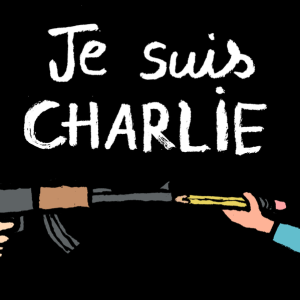Should I Be Charlie Hebdo?
It’s been a couple of weeks since two Islamic terrorists attacked and killed 12 people for publishing cartoons mocking the Prophet Muhammad. What lessons can we learn, when cooler heads prevail, from this horrific event?
prevail, from this horrific event?
The first lesson is theological. On that tragic and horrific day, Cherif and Said Kouachi, contrary to the most basic understanding of Islam, acted as gods. The first pillar of Islam is that there is just one God (Allah). And Allah alone has the authority to make ultimate decisions concerning human life. The Kouachi brothers, in assuming god-like authority over human lives, affirmed three gods – Allah, Cherif and Said.
In my book, Abraham’s Children: Liberty and Tolerance in an Age of Religious Conflict, Kyai Haji Abdurrahman Wahid, the first democratically-elected President of Indonesia, explains blasphemy within a similar context of murder and satirical cartoons. Wahid, the former spiritual leader of Nahdlatul Ulama (one of the world’s largest Islamic organizations, with close to 40 million members), promoted liberty and tolerance from within a Muslim perspective. In his essay, “God Needs No Defense,” he writes:
As K.H. Mustofa Bisri wrote in his poem “Allahu Akbar”: “If all of the 6 billion human inhabitants of this earth, which is no greater than a speck of dust, were blasphemous … or pious … it would not have the slightest effect upon His greatness.” Omnipotent, and existing as absolute and eternal Truth, nothing could possibly threaten God. And as ar-Rahman (the Merciful) and ar-Rahim (the Compassionate), God has no enemies. Those who claim to defend God, Islam, or the Prophet are thus either deluding themselves or manipulating religion for their own mundane and political purposes, as we witnessed in the carefully manufactured outrage that swept the Muslim world several years ago, claiming hundreds of lives, in response to cartoons published in Denmark. Those who presume to fully grasp God’s will and dare to impose their own limited understanding of this upon others are essentially equating themselves with God and are engaged in blasphemy.
In short, when Cherif and Said Kouachi shot and killed twelve people, allegedly for blasphemy, they themselves were the blasphemers and their actions nothing more than murder. In defiance of Islam’s deepest principles, they acted as gods.
Aspiring to be martyrs, they met Allah as blasphemers and murderers.
Would that the story ended there: with the world, Muslims and non-Muslims alike, understanding and jointly condemning the moral and religious failure of the murderers and blasphemers.
But no.
The response to the actions of a few Muslims has been predictable: blame all Muslims. Assaults against Muslims have shockingly risen. In Villefranche-sur-Saône, a bomb blew up a kebab restaurant near a mosque. In Le Mans, blank grenades were dumped and shots fired at a mosque. Gun shots were fired at a Muslim prayer room in Port-La-Nouvelle. In Paris, a Quran was publicly desecrated at a rally.
The Kouachi brothers likely hoped their actions would incite non-Muslims to hatred and even violence. Such violent responses may incite more terrorists to join the cause. Sadly, they lived just long enough to see their hopes realized.
By giving in to hatred and prejudice, the murderers and blasphemers win.
Finally, and this is a moral lesson, not everything that one has a right to is good. The cartoonists and editors at Charlie Hebdo had the write to print cartoons mocking the Prophet (and Jews and Jesus, for that matter). But just as Nazi cartoons enflamed anti-Semitism, so, too, the Hebdo cartoons enflamed Islamophobia. Hebdo’s stereotypical cartoons portrayed Muslims as Arab towel-headed terrorists. But fewer than 15% of Muslims worldwide are Arabs, fewer men cover their heads (and seldom with towels except after a shower), and the vast majority of Muslims denounces terrorism.
If Muslims are indeed towel-headed terrorists, then we should fear them, isolate them, and disempower them. But most of them aren’t and so we shouldn’t.
I strongly defend Charlie Hebdo’s right to portray Muslims (or Jews or Jesus) in any manner they like. The right to free speech protects all political speech even speech we don’t like. But while they had the right to portray Muslims as they did, doing so, in many cases, was not good.
What made their published cartoons not good?
France’s five million Muslims are a disempowered minority. Young Muslims are twice as likely to be unemployed as non-Muslims (in some neighborhoods Muslim unemployment is as high as 40%). The ban on head coverings disproportionately affects Muslims (in the free expression of their religion). Local communities refuse to authorize the construction of mosques creating a dearth of worship spaces. Muslims face housing discrimination and many live in utter poverty. Laws reinforcing secularism seem aimed directly at Muslims. In short, French Muslims are socially, religiously and economically marginalized.
Because they are prevented from fully integrating into their new country, French Muslims remain deeply attached to their home country and religion. Nearly half of France’s Muslims consider themselves Muslim first and foremost (do the math, more than half consider themselves French first).
Piling insults onto injustices perpetuates Muslim marginalization. Piling insults onto prejudices enflames Islamophobia. Increasing Muslim marginalization and enflamed Islamophobia seem likely to produce the kind of conflagration that only murderers and blasphemers could hope for.
Mockery is no substitute for taking the time to get to know people who are very different from ourselves.
So while I endorse free speech, I am not Charlie Hebdo.
Kelly James Clark's Blog
- Kelly James Clark's profile
- 28 followers



